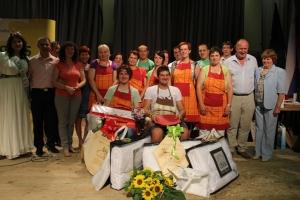
I sell bread, tea biscuits, potica cakes, home-made noodles, mlinci (Slovenian pasta made from thin dried dough), apple juice, marmalades, elderflower syrup, and similar producs," she says, and adds:"I do it by myself, with a little help from my daughter who is 10. Well, my three children also help with marmalade, and with gathering elder flowers."
I persist in this line of work because I enjoy offering to my children as healthy food as possible, and I am also raising them in this manner«.
On our farm still a lot of manual labour is required: grass is mowed with a scythe, hay is turned by hand, there is a lot of raking…
She won the title in August, after beating all 10 competitors with her knowledge of farm chores, and her skills. 33-year-old Darja lives on a mountain farm in Škale near Velenje with her husband, his parents, and three children. She considers the title primarily of promotional value, as in spite of her farm chores she finds the time to bake and make other home-made treats she sells at the Velenje market.
Darja finished the five years of Home Economics School in Velenje. For twelve years she worked in hospitality industry, but after the birth of her third child her husband Branko, who is still employed, and she decided that she would stay at home and work on their farm of 54 hectares (most of it forested). They work the farm by themselves, and her mother- and father-in-law, and their children help as much as they can.
She makes pastry, bread, marmalade, and juices, and sells them at the market
The basic activity on the farm is cattle farming. "We feed cattle, and raise suckler cows. We also breed piglets, rabbits, and laying hens," Miklavžina explains and adds that they grow all their food by themselves – and share it with others. The years she spent in the hospitality industry have encouraged her to register a supplementary activity. "I sell bread, tea biscuits, potica cakes, home-made noodles, mlinci (Slovenian pasta made from thin dried dough), apple juice, marmalades, elderflower syrup, and similar products," she says, and adds: "I do everything by myself, with a little help from my daughter who is 10. Well, my three children also help with marmalade, and with gathering elder flowers. There is a great demand for her home-made products at the market, mainly by older people, but some young families are also aware that such things should be consumed."
Mowing grass by hand, turning hay by hand, and a lot of raking
As they live on a mountain farm, a lot of work still has to be done manually. "Grass is mowed with a scythe, hay is turned by hand, there is a lot of raking." She grew up on a farm as well, but there most of the work was done by machines, which is no option on a mountain farm. "During haymaking we must all go to the meadow and rake, while on the farm where I grew up one person was able to do it by himself, with the help of machines," she points out the basic difference between mountain farms and farms in the flat country. That's the reason they graze their livestock on pastures, and dry hay. The consequence is their livestock is fed only with home grown, natural food, and no artificial feeding stuff. "We feed our livestock in the old manner."
Sleet felled 500 cubic metres of beech trees – but you can't sell the wood
A large part of their farm is covered by forest, mostly beech, but the damage by sleet in February was extensive. "Our forest grows on steep, rocky terrain, and consequently sleet damaged approximately 500 square metres of beech trees." So her husband, besides going to work and working on the farm, also works hard on clearing the wood.
The celebrated European funds don't help much, she says, as their farm is too small. "The funds go mostly to large farmers." Since she has been living on the farm, she has applied for tender only when registering for the supplementary activity: "I applied for farming tenders intended for supplementary activities, and my application was approved."
"To lead a healthy life, and work!"
Yet despite the problems she enjoys being a farmer, and she is extremely proud of her work. "I persist in this line of work because I enjoy offering to my children as healthy food as possible, and I am also raising them in this manner." Her moto is: "To lead a healthy life, and work!". She has noticed that professional farmers are now much more respected than in the past. "I believe that people have realized that it is a profession worthy of respect, and that it demands hard work and effort, and includes danger as well."
I sell bread, tea biscuits, potica cakes, home-made noodles, mlinci (Slovenian pasta made from thin dried dough), apple juice, marmalades, elderflower syrup, and similar producs," she says, and adds:"I do it by myself, with a little help from my daughter who is 10. Well, my three children also help with marmalade, and with gathering elder flowers."
I persist in this line of work because I enjoy offering to my children as healthy food as possible, and I am also raising them in this manner«.
On our farm still a lot of manual labour is required: grass is mowed with a scythe, hay is turned by hand, there is a lot of raking…

































































